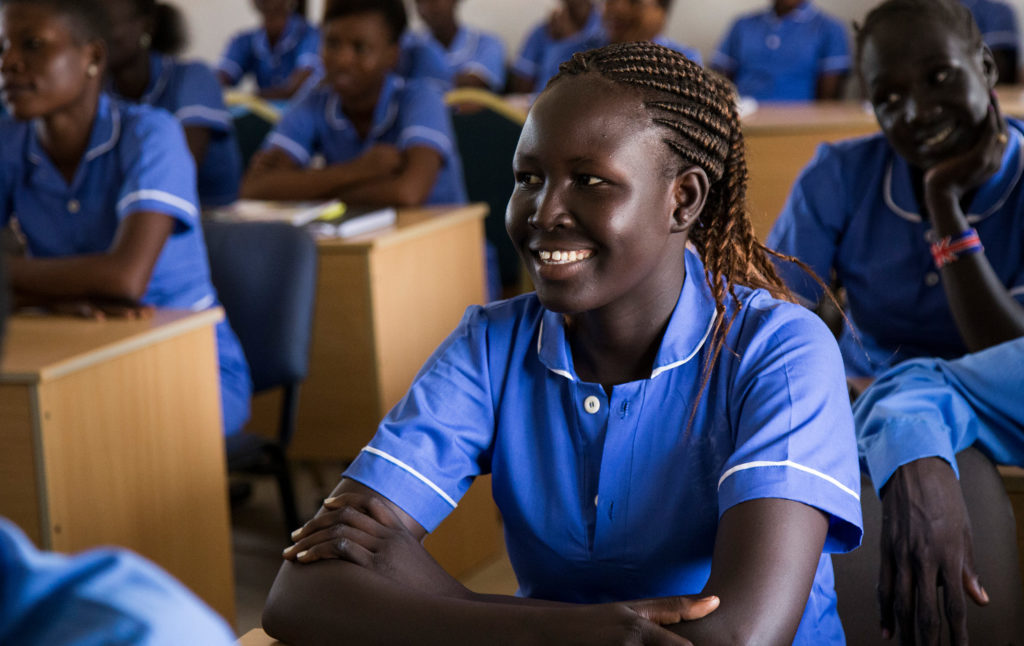
Midwife Training
Women's & Children's Health
Because they are often the most vulnerable in times of crisis, International Medical Corps works tirelessly to save the lives of mothers and children living in the midst of war, disaster and outbreaks of disease. Every year, an estimated 300,000 women and 3 million newborns die from complications during pregnancy, childbirth or other neonatal causes. More than 90% of these deaths occur in low- and middle-income countries, and most could be prevented with low-tech, low-cost care in the form of a skilled midwife—a profession that is tragically under-represented across the world.
According to The State of the World’s Midwifery 2014, trained midwives could provide 87% of the essential care needed for women and newborns. Midwives can identify complications around pregnancy and childbirth early, provide first-line emergency care and, when needed, refer cases to appropriate higher-level care. Adequately trained midwives can also provide prenatal care, family planning, testing and counseling for sexually transmitted infections, assistance at delivery, postpartum care, newborn care and breastfeeding support.
Investing in midwifery education could yield a 16-fold return on investment in terms of lives saved and costs of caesarean sections avoided, and is considered a “best buy” in primary healthcare.” – The State of the World’s Midwifery 2014
To help fill a massive global gap in maternal healthcare, International Medical Corps runs robust midwife training programs in counties that have the highest maternal mortality rates in the world, including South Sudan, Afghanistan and the Central African Republic.
South Sudan
War-torn South Sudan has one of the highest maternal mortality rates in the world. Each mother in South Sudan has a one in seven chance of dying in childbirth during her lifetime. Meanwhile, 25% of South Sudanese babies die from common, often preventable, illnesses before they reach their fifth birthday.
Though we provide comprehensive maternal healthcare in all of our primary health clinics, as well as emergency obstetric care in secondary health facilities, it remains imperative to strengthen South Sudan’s healthcare worker capacity. Decades of conflict and insecurity have decimated South Sudan’s workforce, leaving much of the population without access to basic care. To ensure that mothers and children throughout the country receive the lifesaving services they need, International Medical Corps trains midwives and nurses who then take their skills and knowledge back into underserved communities.
We previously supported midwife training at the National Training Institute at Kajo Keji, the National Midwifery School in Wau and the Juba College of Nursing and Midwifery. Our programs included classroom programs, skills-building in laboratory and clinical settings, and continuous professional development and mentorship. From 2012 to 2022, International Medical Corps graduated 631 midwives and nurses, and many of whom now work for International Medical Corps. We currently provide on-the-job training to midwives and other healthcare workers at Malakal Teaching Hospital and at more than 20 International Medical Corps-supported health facilities across Malakal.
In South Sudan, International Medical Corps has helped increase the number of midwives by more than 2,000%.
Meet the courageous and determined midwives of South Sudan.
Central African Republic
As the Central African Republic (CAR) struggles to emerge from decades of conflict, its government has identified maternal health as a top national priority, due to the ways it will help other sectors of society, including improved economic growth, family nutrition and education.
To address CAR’s extremely high maternal mortality rate, International Medical Corps established a new school for nursing and midwifery, named L’Ecole de Formation des Assistantes Accoucheuses de Bria. Strategically located in Bria, in east-central CAR, the school will serve the Haute-Kotto, Vakaga, Mbomou and Haut-Mbomou prefectures.
The school opened its doors to its first class of 30 students on February 10, 2020, with the support of the country’s Ministry of Public Health and Population (MoPHP), but closed two weeks later—along with all other institutions of higher learning in the country—due to the COVID-19 pandemic.
International Medical Corps plans to reopen the school in October. The students will again be recruited from current employees of MoPHP-supported health centers and clinics around Bria. The two-year auxiliary midwife certification program will qualify them to provide a range of nursing and midwifery functions when they return to their health centers and clinics.
International Medical Corps is working closely with Bangui University of Health Sciences to ensure that the new nursing and midwifery program complies with international standards and remains sustainable at the national level well into the future.